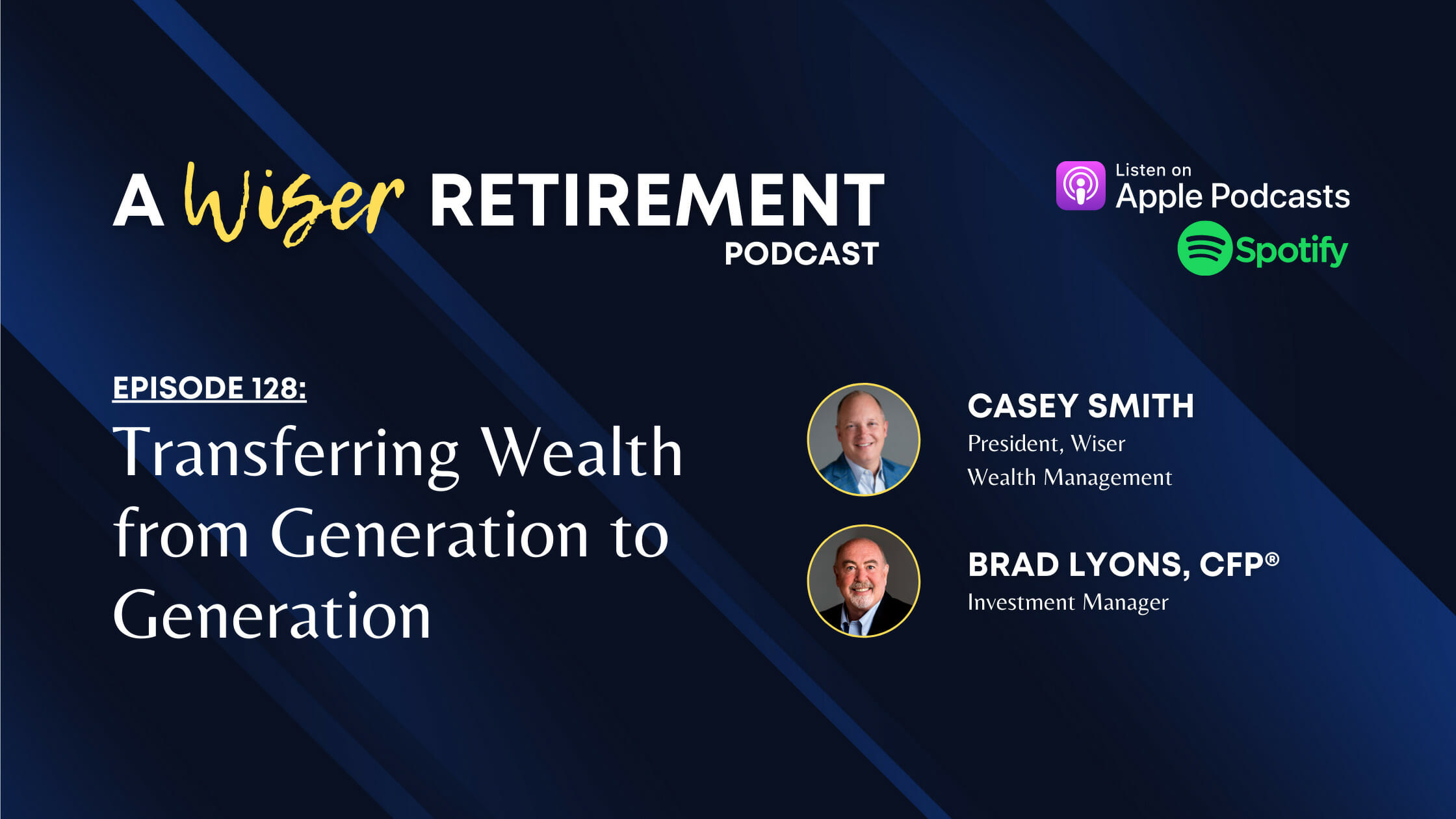
Transferring Wealth from Generation to Generation
On this episode of A Wiser Retirement Podcast, Casey Smith and Brad Lyons, CFP® talk about transferring wealth from generation to generation and go over what we’ve talked regarding legacy planning during the past quarter.
Listen on Apple Podcasts or watch on YouTube:
SUMMARY:
What exactly does leaving a legacy mean?
When people die, they leave their assets behind without a lot of thought besides maybe a will. More times than not, there is very little discussion about it, which isn’t unusual because talking about death is not a comfortable topic. A lot of times, parents don’t want their children to be concerned over their finances. They want their kids to go out and flourish on their own without the burden of knowing too much about their parents’ financial situation.
It is time to realize they aren’t young anymore, and that it could be beneficial to bring them into the conversation. This is needed in order for their children to understand what it took for their parents to raise them. It also helps the overall process of transferring wealth to be a smoother transition.
Wealthy vs Rich
A lot of people interchange wealthy and rich, when in reality, there is a big difference between these two. Being rich is having a lot of money but also spending a lot of money. Being wealthy is being able to do the things you want and having the freedom to do those things. There are a lot of rich people that aren’t wealthy because they are slaves to payments from their lifestyle.
Successfully Transferring Wealth
In order to successfully transfer wealth, it is important to go through the estate planning process. This process will lay out exactly what you want to leave behind. Your legacy isn’t just monetary, it also includes your values, future plans and so much more.
It’s important to have the right people on your team to guide you through the estate planning process. At Wiser, we work with a trusted network of CPAs and attorneys.
Gary Bottoms, CLU®, ChFC® joined us on episode 122 of the podcast to talk about how everything starts with insurance. We believe this can’t be true because everything needs to start with a financial plan, which includes insurance planning and analysis.
Legacy Planning Advice
In prior podcast episodes, we have seen guests like James Hughes Jr. and Nick Rosenbauer who have given us insights into different estate planning topics. Nick joined us to talk about the importance of college kids getting a power of attorney and a medical detective. This is important because if your college-aged child gets hurt, the hospital legally cannot give information to the parent since the child is over the age of 18.
Throughout this series, we have talked a lot about building a legacy and transferring wealth and how one of the main things to do is start when your kids are young. This not only helps you build your legacy more efficiently, but it also helps you lead by example. Legacy isn’t just the transferring of wealth but it’s also about family communication, commitment and continuance.
When you pass away, you are bound to leave possessions behind. They can be left either intentionally or accidentally, but either way something will be left behind. If you aren’t sure how to intentionally make a plan for the assets you will leave behind, click here to download this free guide with 7 steps to leave a financial legacy. This is a great resource to help guide you through the process of leaving a legacy.
Download our white paper on “7 Steps to Leave a Financial Legacy”
TIMESTAMPS:
0:00 Intro
2:25 What Exactly does Leaving a Legacy Mean?
3:58 Wealthy vs Rich
5:17 Teaching the Next Generation
8:14 Successfully Transferring Wealth
12:30 Advise from Prior Podcast Episodes
LINKS:
Learn more about Casey Smith and Brad Lyons, CFP.
CONNECT:
Twitter, Instagram, Facebook, LinkedIn, and YouTube.
Learn more about A Wiser Retirement podcast and access previous episodes.
Share This Story, Choose Your Platform!
Wiser Wealth Management, Inc (“Wiser Wealth”) is a registered investment adviser with the U.S. Securities and Exchange Commission (SEC). As a registered investment adviser, Wiser Wealth and its employees are subject to various rules, filings, and requirements. You can visit the SEC’s website here to obtain further information on our firm or investment adviser’s registration.
Wiser Wealth’s website provides general information regarding our business along with access to additional investment related information, various financial calculators, and external / third party links. Material presented on this website is believed to be from reliable sources and is meant for informational purposes only. Wiser Wealth does not endorse or accept responsibility for the content of any third-party website and is not affiliated with any third-party website or social media page. Wiser Wealth does not expressly or implicitly adopt or endorse any of the expressions, opinions or content posted by third party websites or on social media pages. While Wiser Wealth uses reasonable efforts to obtain information from sources it believes to be reliable, we make no representation that the information or opinions contained in our publications are accurate, reliable, or complete.
To the extent that you utilize any financial calculators or links in our website, you acknowledge and understand that the information provided to you should not be construed as personal investment advice from Wiser Wealth or any of its investment professionals. Advice provided by Wiser Wealth is given only within the context of our contractual agreement with the client. Wiser Wealth does not offer legal, accounting or tax advice. Consult your own attorney, accountant, and other professionals for these services.





